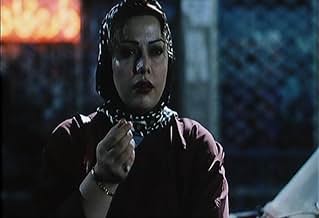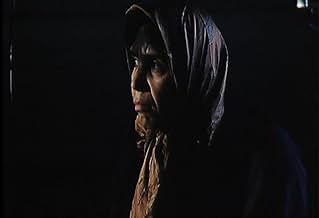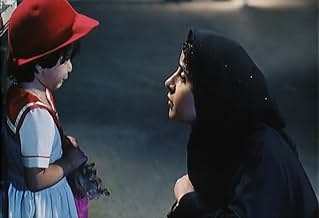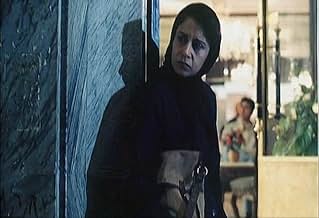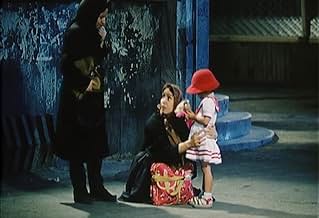Varias mujeres luchan por funcionar en la sociedad opresivamente sexista del Irán contemporáneo.Varias mujeres luchan por funcionar en la sociedad opresivamente sexista del Irán contemporáneo.Varias mujeres luchan por funcionar en la sociedad opresivamente sexista del Irán contemporáneo.
- Dirección
- Guionistas
- Elenco
- Premios
- 12 premios ganados y 7 nominaciones en total
Maryiam Palvin Almani
- Maryam Parvin Almani (Arezou)
- (as Maryam Parvin Almani)
Fereshteh Sadre Orafaiy
- Fereshteh (Pari)
- (as Fereshteh Sadr Orafai)
- Dirección
- Guionistas
- Todo el elenco y el equipo
- Producción, taquilla y más en IMDbPro
Opiniones destacadas
Devastating film that details the harsh treatment of women in Iran. The film begins with a hospital scene, where a family take the news of a new baby girl in the family so harshly that one would think the child had been stillborn. Following that the story introduces us to a group of women, one after the other, each of them recent convicts (in Iran a woman is put in jail indefinitely for riding in a car with a man she is not related to) who have their own struggles to overcome before they can seek asylum from the clausterphobic society that surrounds them. The film isn't as satisfying as it should be (even given its subject matter), and definitely deserves to be more engrossing. It is, however, an important human rights issue worth examining and for all it shows of a world as different from our North American society, it deserves a good look from us all.
A baby girl is born, and the grandmother regrets for the sex of the baby. Three women are released under probation from the jail and get lost into the crowd, without courage to come back home and having no money. A woman escape from the jail to make an abort and is expelled from her own home by her family. Another woman left her daughter of about six years old alone on the street. A prostitute is arrested with her client in his car, and the man is released by the police later while the woman goes to jail. All of these individuals and disconnected situations are presented to show the repressive situation against the women in the Iranian society. In the end, like in a circle, all of them ends arrested in the jail. I am not aware of the behavior of the Iranian society with their women, but this movie portraits a horrible picture. The women are showed without freedom, depending on her husband or her family even for simple actions, like traveling in a bus. If their society works this way, how are these actresses daily treated after their performances in this movie? The camera and the direction are excellent. It is amazing the capability of the Iranian filmmakers in making simple but touching films. My vote is eight.
Title (Brazil): `O Círculo' (`The Circle')
Title (Brazil): `O Círculo' (`The Circle')
In Jafar Panahi's claustral feature debut, the brilliant central conceit is that being a woman in Iran is exactly equivalent to being the Wrong Man in an Alfred Hitchcock movie. In the movie's nameless Iranian city, the narrative baton is handed off from one woman to another, each of them missing an ID card, a chaperoning male, some form of social validation; without it, the long arm of the law winds around each woman like a python. Panahi's style--long, fluid takes that are at once bruisingly verite and dreamlike--buckles in the script's ingenious (and perhaps unconscious) major device: in this movie, women are a secret underworld with nodding, unspoken signals, just like hoodlums silently acknowledging one another in a gangster picture. There is no warm-hug sisterhood here, just the desperate mutual regard of the about-to-be-caught.
The honesty and unfussiness of the style of contemporary Iranian directors enables them to get away with stuff other artists might not, such as the ending of this movie, which, in a European or American movie, might seem thuddingly unsubtle. Here, it seems like the fulfillment of a nightmare--and it works because of Panahi's wittily blunt style, which is pitched somewhere between Iranian neorealism and Elaine May's MIKEY AND NICKY. And it works because of our constant recognition of the literal, physical courage of the movie: our glimpses of current state attitudes toward abortion, prostitution and corrupt police are so bald one marvels at Panahi's (and the cast and crew's) effrontery. Never has chador seemed less exotic and more evil--a manifestation of a terror of the beauty and pleasure of the female body that seems to engulf each character like a Cronenbergian plague. (The movie's wittiest touch is Cronenbergian, too: a woman character has a tic that gives her away to the cops--pregnancy-induced vomiting.)
The honesty and unfussiness of the style of contemporary Iranian directors enables them to get away with stuff other artists might not, such as the ending of this movie, which, in a European or American movie, might seem thuddingly unsubtle. Here, it seems like the fulfillment of a nightmare--and it works because of Panahi's wittily blunt style, which is pitched somewhere between Iranian neorealism and Elaine May's MIKEY AND NICKY. And it works because of our constant recognition of the literal, physical courage of the movie: our glimpses of current state attitudes toward abortion, prostitution and corrupt police are so bald one marvels at Panahi's (and the cast and crew's) effrontery. Never has chador seemed less exotic and more evil--a manifestation of a terror of the beauty and pleasure of the female body that seems to engulf each character like a Cronenbergian plague. (The movie's wittiest touch is Cronenbergian, too: a woman character has a tic that gives her away to the cops--pregnancy-induced vomiting.)
While reading the various interviews with Jafar Panahi concerning his latest film "The Circle", I noticed that he always stresses the fact that his film is not a feminist film, but a humanist film. I'm reminded of the times I've been in a political conversation with someone and they've said "I'm no feminist but..." and then said something in defense of women's rights. Well, whether he intended it or not, Panahi has made a feminist film, because after all, feminism in its most basic form has nothing to do with hating men, but is merely a desire for the fair and equal treatment of women, and equal human rights is of course a cornerstone of humanism. I'm no scholar (and that I can say in all honesty) but yes, I would say I'm a feminist. I've never been on a march, and I've never read the works of any great feminist theorists, but to the core of my soul I believe in the equal and fair treatment of women, and if that doesn't make me a feminist I don't know what does.
Of course, all this discussion about feminism wouldn't matter if "The Circle" wasn't such a strong film. Panahi's film, almost universally praised, will receive no negative criticism here either. His use of narrative (most reviews compare the narrative style to "La Ronde" [1950], but I suppose comparisons could be made with "The Phantom of Liberty" [1974] and "Slacker" [1990], for that matter) might be perceived by some rob the characters of their individuality, but of course that is part of the point. In Iran today women are all grouped together, Panahi is saying, and they are seen as no more that a collective problem for men to deal with. Ultimately, there is nothing I can say about this film that hasn't been said before, but I wanted a chance to express my appreciation for this extraordinary myself.
Of course, all this discussion about feminism wouldn't matter if "The Circle" wasn't such a strong film. Panahi's film, almost universally praised, will receive no negative criticism here either. His use of narrative (most reviews compare the narrative style to "La Ronde" [1950], but I suppose comparisons could be made with "The Phantom of Liberty" [1974] and "Slacker" [1990], for that matter) might be perceived by some rob the characters of their individuality, but of course that is part of the point. In Iran today women are all grouped together, Panahi is saying, and they are seen as no more that a collective problem for men to deal with. Ultimately, there is nothing I can say about this film that hasn't been said before, but I wanted a chance to express my appreciation for this extraordinary myself.
Iranian director Jafar Panahi's Golden Lion winner of 2000, "Dayereh", is a critical and extremely powerful film about women who suffer from the injustices of the laws of the Islamic Republic.
As an atheist I support no religions, and I do not think one is better or more respectful to human lives than any other. "Dayereh" is a film that is concerned with religion only as far as it is a film that takes place in Iran, a country where Islamic Law dominates or even rules over the secular law. I am not an expert on Iranian law, but I do hold "Dayereh" to be the TRUTH, not a propaganda fiction of no concern to reality. Therefore, I admire Iranian directors who constantly produce magnificent films although they have to battle against censorship and the strict rule of the Ayatollah. This perhaps forces filmmakers to adapt a more poetic film semiotics, perhaps only suggesting cruelty and injustice, not showing it directly like Western directors are allowed to do.
Like Mohsen Makhmalbaf and Abbas Kiarostami before him, Jafar Panahi has succeeded in producing a small, but superb film. Kambuzia Partovi's script is great, linking the misfortune and fates of several young Iranian women together into a whole narrative. All four or five women (one is not as thoroughly described) have committed unlawful acts, but their crimes are not explicitly stated in the dialogue of the film. However, we understand that their crimes would not be considered near a crime in most other countries, because it is related to sex and female independence, not to real criminality. Bahram Badakshani's camera is always close to the women, and their acting is nothing less than brilliant. The tracking movement of the camera and the shots composed by a hand-held camera result in many long takes, where the actresses get to show their skill wihtout editing. This is also a marvellous success for the director Panahi.
This film also contains a subtle symbolic factor, namely the wish for several of the women to smoke a cigarette. Different interruptions and laws concerning females and cigarettes prevent the women to smoke until one of the last scenes, when a women is arrested for travelling alone in a car with a man to whom she is not married (prostitution?). When a male prisoner is lighting up his cigarette, the woman does the same, and this time no one stops her. The smoking of the cigarette is not a symbol of freedom, because all the young women end up back in prison, but the cigarette does create a symbol of escape, although it is an escape from society, and not from the persecution of women who act like human beings (in Iran, read men). The smoking becomes Virginia Woolf's room of their own, the escape from a society that does not want them to be free.
As an atheist I support no religions, and I do not think one is better or more respectful to human lives than any other. "Dayereh" is a film that is concerned with religion only as far as it is a film that takes place in Iran, a country where Islamic Law dominates or even rules over the secular law. I am not an expert on Iranian law, but I do hold "Dayereh" to be the TRUTH, not a propaganda fiction of no concern to reality. Therefore, I admire Iranian directors who constantly produce magnificent films although they have to battle against censorship and the strict rule of the Ayatollah. This perhaps forces filmmakers to adapt a more poetic film semiotics, perhaps only suggesting cruelty and injustice, not showing it directly like Western directors are allowed to do.
Like Mohsen Makhmalbaf and Abbas Kiarostami before him, Jafar Panahi has succeeded in producing a small, but superb film. Kambuzia Partovi's script is great, linking the misfortune and fates of several young Iranian women together into a whole narrative. All four or five women (one is not as thoroughly described) have committed unlawful acts, but their crimes are not explicitly stated in the dialogue of the film. However, we understand that their crimes would not be considered near a crime in most other countries, because it is related to sex and female independence, not to real criminality. Bahram Badakshani's camera is always close to the women, and their acting is nothing less than brilliant. The tracking movement of the camera and the shots composed by a hand-held camera result in many long takes, where the actresses get to show their skill wihtout editing. This is also a marvellous success for the director Panahi.
This film also contains a subtle symbolic factor, namely the wish for several of the women to smoke a cigarette. Different interruptions and laws concerning females and cigarettes prevent the women to smoke until one of the last scenes, when a women is arrested for travelling alone in a car with a man to whom she is not married (prostitution?). When a male prisoner is lighting up his cigarette, the woman does the same, and this time no one stops her. The smoking of the cigarette is not a symbol of freedom, because all the young women end up back in prison, but the cigarette does create a symbol of escape, although it is an escape from society, and not from the persecution of women who act like human beings (in Iran, read men). The smoking becomes Virginia Woolf's room of their own, the escape from a society that does not want them to be free.
¿Sabías que…?
- TriviaPanahi adopted a different camera style to depict each of the four main protagonists' lives. For the first, an idealistic woman he used a handheld camera. For the second woman, the camera is mounted on a constantly moving dolly. The third woman's story is told at night in darker outside, and the camera is static with pans and tight close ups. For the last, least optimistic woman both the camera and the woman are completely immobile and very little sound is used.
- ConexionesFeatured in Cinema Iran (2005)
Selecciones populares
Inicia sesión para calificar y agrega a la lista de videos para obtener recomendaciones personalizadas
- How long is The Circle?Con tecnología de Alexa
Detalles
- Fecha de lanzamiento
- Países de origen
- Sitio oficial
- Idioma
- También se conoce como
- The Circle
- Locaciones de filmación
- Productoras
- Ver más créditos de la compañía en IMDbPro
Taquilla
- Presupuesto
- USD 10,000 (estimado)
- Total en EE. UU. y Canadá
- USD 440,554
- Total a nivel mundial
- USD 756,035
Contribuir a esta página
Sugiere una edición o agrega el contenido que falta


